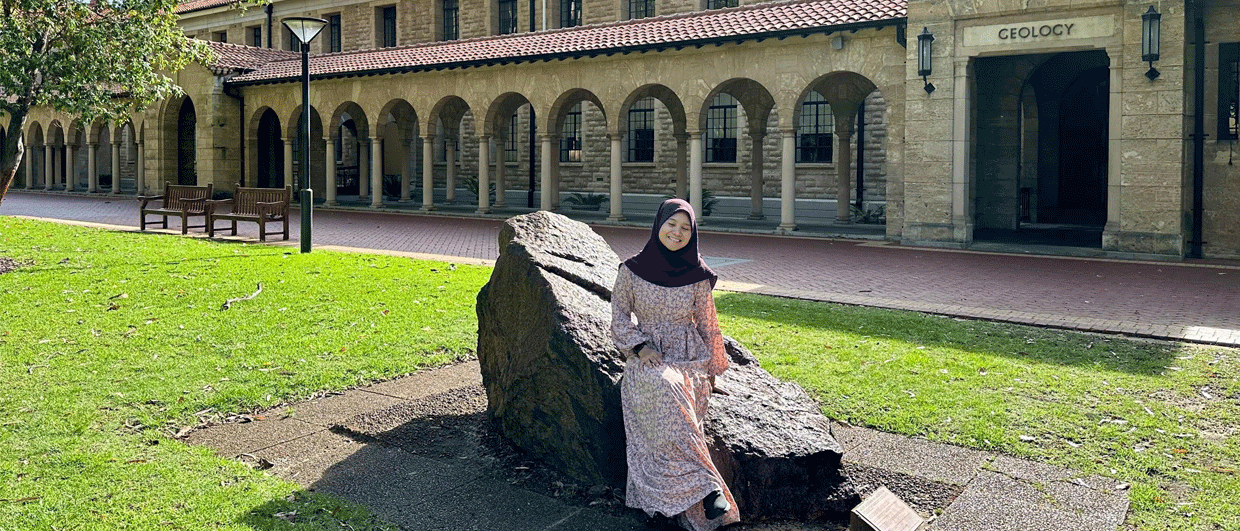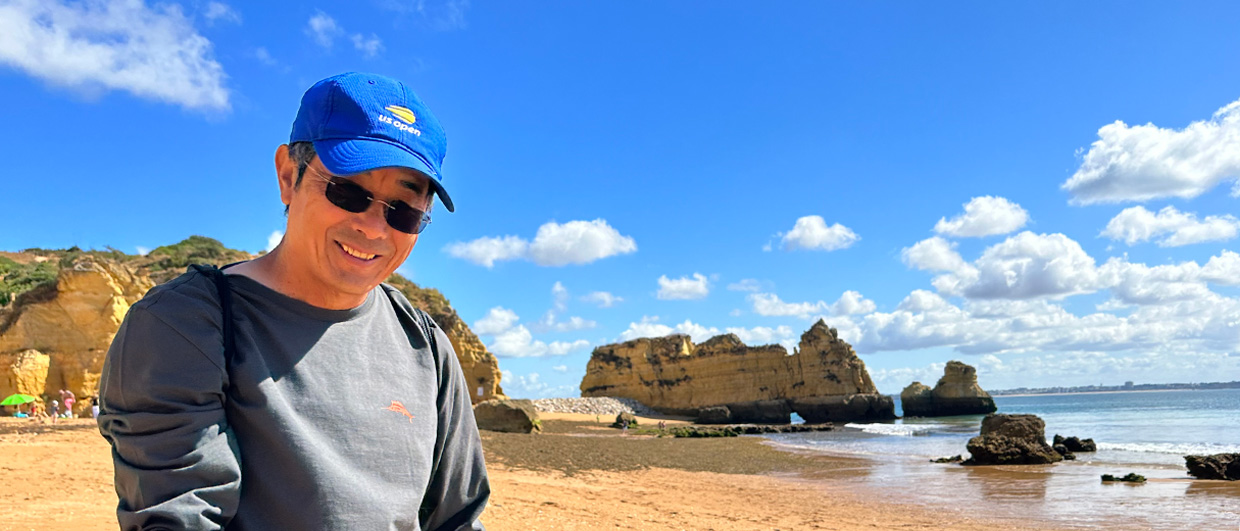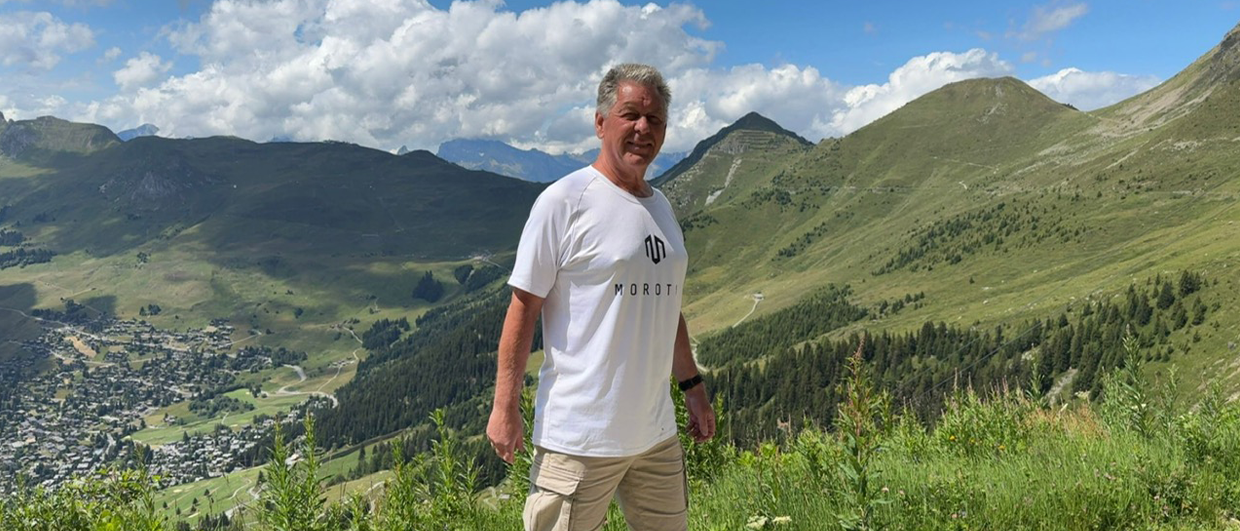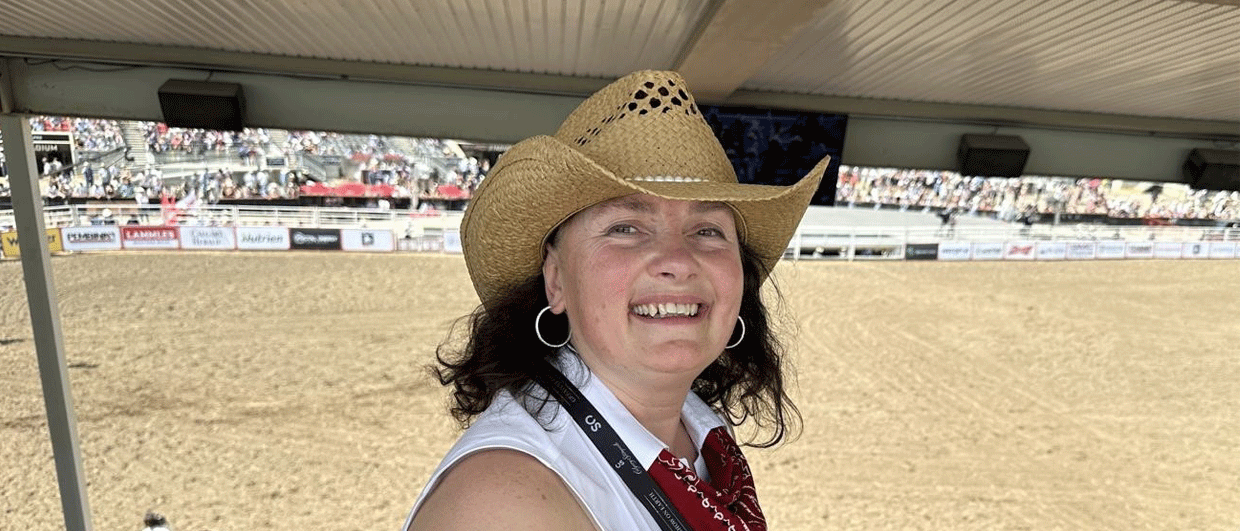“I grew up in the state of Perak, north of Kuala Lumpur, in the town of Batu Gajah. Being the oldest of eight children, I felt the responsibility to take care of my younger siblings from an early age,” says Aqilah when we start our conversation. “This became even more serious and even badly needed when my dad passed away due to a heart attack when I was only 11 years old,” she continued.
From one day to the other, the family was without an income, with only a small pension contribution from her dad. “I think it changed me inside,” says Aqilah, “all of a sudden, I needed to be stronger and help my mom.”
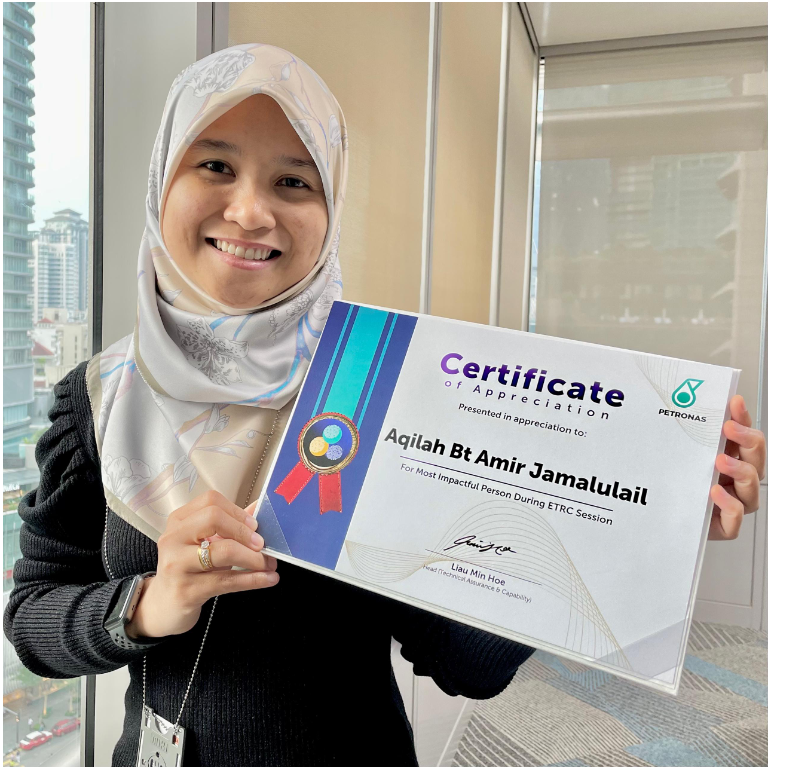
The family had to do their utmost best to make ends meet. “For the annual Raya festival, we relied on clothes donations from the neighbourhood,” says Aqilah. “We were given bundles of clothes to look through, and luckily often there was something that matched our sizes,” she laughs.
“It is bittersweet now,” she says, “when looking back at that time and knowing that our situation has changed in a positive way. But it was really tough, especially for my mom.”
A bit of a turning point for the family came when one of their neighbours recommended moving to the state of Selangor immediately north of Kuala Lumpur, where support for those who needed it was well established by the Selangor Zakat Board, the Muslim body responsible for collecting and distributing charity in the Selangor state. So, the family did move and benefitted from the system that provided them with rice, flour and other basic food ingredients from time to time.
“We also had a good system in place to share responsibilities in the house,” Aqilah says. “I took care of the youngest, my next sibling in line took care of the second youngest, and so on.”
As well as being there for the family, Aqilah also felt the need to excel at school. She wanted to set an example and demonstrate that despite the difficult circumstances, it was still possible to perform well. For that reason, during the last year of primary school, not long after the unexpected loss of her dad, Aqilah was rewarded for being the best achiever in UPSR (the national exam for primary school) and for being a role model of the year.
Because of her good performance at school, Aqilah was offered a place at a science boarding school in Perak, back in the area where she grew up. “Even though my mom was reluctant to see me go, I made that decision for myself,” Aqilah says. So, she left the house at the age of 13 and completed five years at boarding school. “I did not experience it as hard,” she continues, “as I already had become a fairly independent person.”
Aqilah continued to focus on her studies in boarding school, and again, it paid off. Based on her good results, she was recognized as the best student in PMR (Lower Secondary Exam) as well as in SPM (Upper Secondary Exam) at the very end of the curriculum. “In some ways,” she reflects, “everything that had happened to us as a family gave me an enormous sense of purpose.”
The best students need to take up medicine
As the end of her time at boarding school approached, Aqilah started thinking of what the next step would be. “Traditionally”, she says, “the best-performing students were expected to study medicine. For that reason, the teachers showed some reservation when I decided to pursue the opportunity to study geology abroad under a scholarship provided by PETRONAS,” she laughs.
“Let’s not sugarcoat it, it was not only a natural interest in geosciences that attracted me to it,” she continues, “it was also the prospect of a potentially higher financial reward.” And given the circumstances Aqilah grew up in, that can be very well understood.
Let’s not sugarcoat it; it was not only a natural interest in geosciences that attracted me to it, but it was also the prospect of potentially higher financial reward.
PETRONAS offered Aqilah a scholarship to embark on a geoscience degree in Melbourne, Australia. But there was one stumbling block: How to finance the journey to Australia and have a proper set of clothes to cope with the different climate? That was not easy for the family, as the finances were still tight.
Then something unexpected happened. A fund-raising event was organized by neighbours and friends from the village where her family lived, with the collected funds handed over during an emotional speech delivered by the committee head. “We have had a lot of help from people over the years,” says Aqilah, “but this act of generosity was really more than I could have wished for, it was heartwarming.”
Getting used to a new way of learning – Australia
When Aqilah arrived in Melbourne, it was the first time for her abroad. And even though she was helped by senior students, and locals were very welcoming, she had a difficult time. One of the key reasons for this was the totally different way the educational system worked in Australia compared to Malaysia. “Back home, studying was a very individual affair,” Aqilah says. “I was good at it, and I was the master of my destiny. In Melbourne, we were often supposed to work in groups, which was totally new to me. I struggled with it, and at the same time, I wasn’t really used to asking for help either. Reflecting on it now,” she says, “I wasn’t my best self.”
Waiting for the first pay slip
After completing her geology degree in Australia, Aqilah knew what the next step in her career would be – her first job at PETRONAS. Finding a place to live in Kuala Lumpur was not that easy, and she hardly had money to spare, so she moved back home for a while and became a commuter. It did not last long, though; after she got her very first pay slip, she soon managed to find a place to live in Malaysia’s capital.
During the first year with the company, Aqilah worked on seismic processing techniques until it dawned on her that all this data crunching was done for a purpose. And it was that purpose that caught her attention: Exploration geology and seismic interpretation. So, she asked if she could be transferred to the exploration ventures department and received a positive response. It started a long and still ongoing career looking for new oil and gas accumulations. And in Aqilah’s case, she got the third time lucky.
“WHAT HAVE WE DONE TO THIS JUNIOR?”
“One of the first things I had to do when I started the job in PETRONAS,” says Aqilah, “was to sign up for a credit card. It was a totally new concept to her, having grown up in such a financially constrained environment.
The card had only just arrived when Aqilah was asked to make a hotel reservation for a team meeting in a few weeks. But then, the meeting had to be postponed, and her manager asked her to arrange this with the hotel. Being new to such a process, Aqilah panicked and said the booking had already been made. Seeing the worries in her eyes, her colleagues decided to go a bit further and said that the only option now remaining was to cancel the card. “And I did,” she laughs, “as I thought I could not expense the money because I was told the meeting was postponed. My colleagues felt a bit guilty afterwards!”
Number 1 – supported by an extension cable
“All I knew was that the prospect I was now being made responsible for was going to be drilled in less than 1.5 years,” laughs Aqilah when we get to talk about her first months in the exploration team. It was a 100 % PETRONAS Carigali well she was now assigned to, in the Peninsular Malaysia area. But apart from having some experience with seismic data, she did not have any idea where to start.
It made her decide to seek technical support from specialists in the company. Support she also received, ranging from proper technical advice to someone buying her an extension cable to enable a second monitor to be plugged in. “I still use that extension cable to this day,” she says, “because it was such a kind gesture from my technical advisor to buy one for me.”
The well she planned was dry, but still, Aqilah had shown that she was able to work independently whilst also being able to ask for help when she needed it. “I was thrown in the deep end,” she says, “but that is exactly what is sometimes needed to learn.”
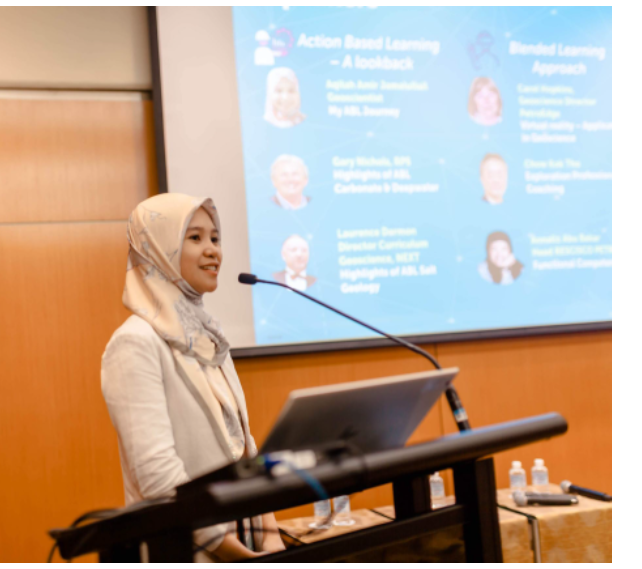
Number 2 – carbonates in Sarawak
The second well Aqilah worked on was in a totally new geological setting – whilst in the Peninsular Malaysia area, she had worked on fluvial and deltaic systems, now she became exposed to the well-known Central Luconia carbonates of Sarawak, in SK408. “And again, I drilled one well,” she says. This time, it was a sub-commercial discovery, so it was a step up in comparison to the first one she had been involved in. “The overpressure in the field turned out to be quite high,” she explains, “which had led to seal the breach and the probable leakage of gas. Because the structure itself was a pinnacle-like shape, the effects of a shifting column had had a detrimental effect on the remaining volume of gas.”
Lang Lebah – third time lucky
After drilling the sub-commercial well in SK408, Aqilah was transferred to the nearby SK410B licence to drill the Lang Lebah prospect in 2019, with PTTEP as the operator. It turned out to be a key moment in her career.
“At first,” she says, “the well did not carry too much weight for PETRONAS because it was a potentially high CO2 and high H2S gas prospect, and at the time, the company was mainly looking for oil. Moreover, PTTEP owned 85 % of the licence, so PETRONAS only had a small share. However, it was the potential of finding a sizeable volume that still caused Lang Lebah to be followed with interest.
The well that was to be drilled on the Lang Lebah structure was not the first one. Two previous attempts had been made, about 30 years ago, with the first well only drilling 1 m of reservoir before it being abandoned. The second well drilled 48 m of reservoir, yet the results were not convincing because of low porosity values obtained. On that basis, it was concluded at the time that the prospect had no further potential, which was still very much the narrative when Aqilah was asked to look at Lang Lebah again.
This also explains why her arguments about elevated gas readings and the presence of a deep-seated fault that provided good charge access were not taken too seriously at the start. She could also prove that the top seal had good characteristics, potentially being able to support a bigger column than people thought, with a P50 of around 250 m. “However, I was told it would be about 50 m tops,” she says.
Still expecting a positive result, though, Aqilah recommended PTTEP to keep a DST on backup in case the drilling data warranted a test. And what happened? The results were encouraging, with the initial gas-down-to already surpassing the economic threshold. And the contact, which was ultimately drilled a year later, came in very close to the structural spill point. “Based on this success, the people who had initially been skeptical, were now advocating to drill all the Luconian carbonate closures in the area,” Aqilah smiled.
Africa calling
When the Lang Lebah well was still in the plugging and abandoning stage, Aqilah was transferred once more and joined the Africa Ventures team in PETRONAS. Here, rather than having to work up and get one prospect drill-ready at a time, she was given a broader remit. For instance, she ensured that regional mapping projects were done in a consistent way, but she also worked on strategic studies to help steer the company’s direction in Africa when it came to future licensing rounds. It also gave her a chance to better study deep-water clastics, which she had not worked on before.
“One of the biggest technical challenges during my time in the Africa team,” she says, “was to convince a major operator who we partnered with in an exploration well to drill a deeper target than they had initially foreseen. It was quite daunting to have these conversations, also because the operator’s team drew on so much experience. For that reason, we worked together with multiple teams from PETRONAS to define a strategy on how to pitch this to TotalEnergies, the operator in question. We also relied heavily on experience from nearby blocks where we are operating to leverage our position. But ultimately, the well was deepened, even though I cannot say too much about the outcome yet, as it happened quite recently.”
There’s more than being technical
Whilst in the Africa team, Aqilah also took more interest in management styles, as she got along very well with her supervisor. “I had the opportunity to hear more about different managerial styles and how it is to work with people from mixed backgrounds,” she says.
Aqilah’s desire to do something more for the company besides being a geoscientist did not come out of the blue. She had already served as the secretariat of the Exploration Management Committee during her time in the Sarawak JV team, which had provided her with experience working with higher management.
I volunteered because I feel that when people feel safe and empowered, they are more effective in the workplace…
So, when the opportunity arose to become the representative in Exploration to help analyse the results of the annual Organizational Culture Survey, she did not think long. “I volunteered because I feel that when people feel safe and empowered, they are more effective in the workplace,” she says.
“Things that I have been able to address and discuss with management following the Culture Survey range from favouritism, lack of collaboration between groups, or more straight forward issues such as software not performing as it should,” explains Aqilah.
“Another thing that we have been able to implement, were courses other than technical and leadership, such as Crucial Conversation Training where we learn about how to have an effective conversation with supervisors. We had a lot of positive feedback from those who attended these courses, because now they know much better how to speak up in both an honest and respectful way.”
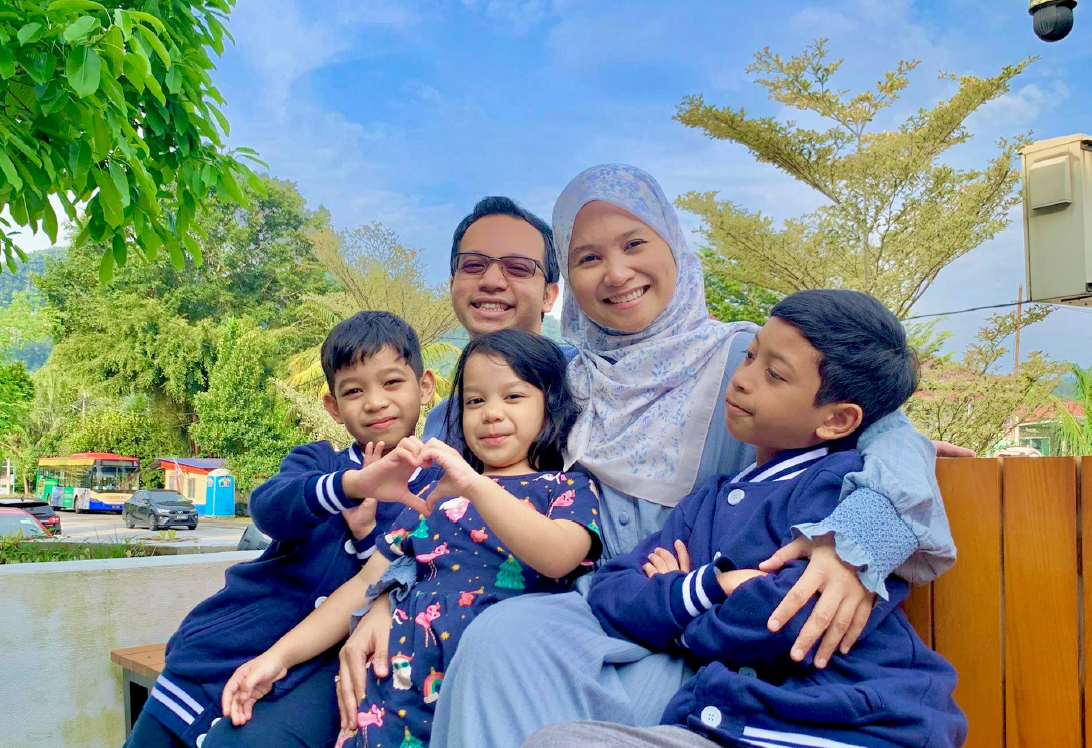
New adventures await
Aqilah is now embarking on a totally new adventure. By the time this article has been published, she and her family will have moved to Perth, Australia, to start a new chapter in their lives. “My husband is an entrepreneur,” Aqilah says, “and he had an opportunity to go to Australia. I am taking a year of unpaid leave from PETRONAS, whilst orientating myself on what my next steps will be.”
We are near the end of the conversation, and Aqilah says how much she has changed over the last ten years. From being a hard-working but very individual and determined student to someone who struggled to open up during group exercises in a totally new university environment, to then embarking on a career in a big organization, where she had to find her way and not only gain technical experience. Along the way, she got to know herself so much better, acknowledging that, in essence, she is an introvert, as she told me. But I think it is this realization that has, in fact, opened her up to so much more.

